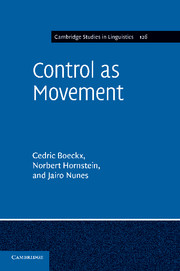Book contents
- Frontmatter
- Contents
- Acknowledgments
- 1 Introduction
- 2 Some historical background
- 3 Basic properties of the movement theory of control
- 4 Empirical advantages
- 5 Empirical challenges and solutions
- 6 On non-obligatory control
- 7 Some notes on semantic approaches to control
- 8 The movement theory of control and the minimalist program
- References
- Index
8 - The movement theory of control and the minimalist program
Published online by Cambridge University Press: 07 September 2010
- Frontmatter
- Contents
- Acknowledgments
- 1 Introduction
- 2 Some historical background
- 3 Basic properties of the movement theory of control
- 4 Empirical advantages
- 5 Empirical challenges and solutions
- 6 On non-obligatory control
- 7 Some notes on semantic approaches to control
- 8 The movement theory of control and the minimalist program
- References
- Index
Summary
Introduction
The movement theory of control (MTC) has been, much to our surprise, a controversial proposal. This book has aimed to outline (and trumpet) its virtues and to consider (and parry) purported vices. In this concluding chapter, we would like to return to the MTC's conceptual foundations, especially as regards its relation to the broader concerns of the minimalist program. Truth be told, our main interest in the MTC has much more to do with minimalism than with control. Or, more accurately, we believe that control is currently interesting because of its near perfect fit with certain central tenets of the minimalist program as realized in the MTC. Indeed, we could be persuaded to go so far as to claim that a minimalistically respectable account of control will necessarily have some version of the MTC at its core. This chapter is a defense of this claim.
The defense will proceed through various layers of abstraction. First, we will remind readers of the fact that (obligatory) control relations exemplify canonical properties of movement, minimalistically construed. Second, we return once again to how the minimalist program and the MTC conceptually intertwine, the latter presupposing the truth of some of the central tenets of the former − in particular, the elimination of D-structure. Third, we argue that the MTC alone is consistent with the explanatory ambitions of the minimalist program.
- Type
- Chapter
- Information
- Control as Movement , pp. 238 - 249Publisher: Cambridge University PressPrint publication year: 2010



